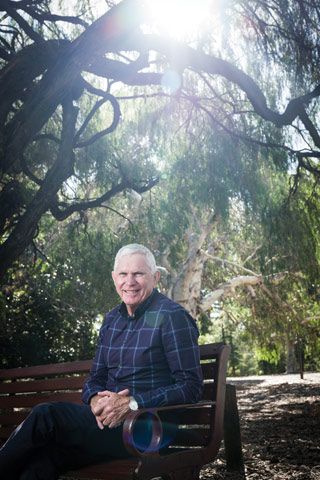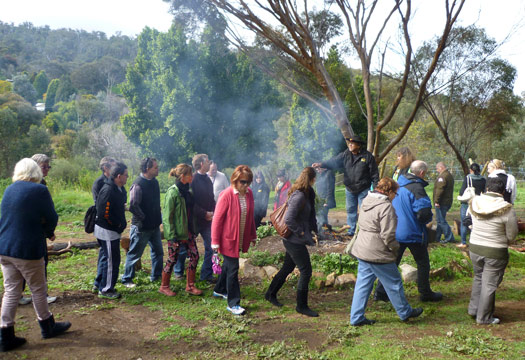Dr Michael Wright clearly remembers the crucial ‘aha’ moment he experienced while working closely with distressed Nyoongar families to identify what was limiting their engagement with mainstream services, despite a spate of mental health crises.
Answering his questions on how to fix ‘the broken system’, the Nyoongar Elders from Armadale to Bentley provided an invaluable insight into the root of the problem.
“Those mainstream services don’t have a relationship with us because they don’t know who we are,” they told him.
“They see us as being one homogeneous group – Aboriginal and Torres Strait Islander – but we are more than that. It’s all about our country, our kin and our family. They just don’t understand Nyoongar culture.”
“And that was it,” Dr Wright said. “That was what it was all about.
“If we couldn’t improve that interface between Aboriginal people and the system itself, then we were not going to go anywhere.
“So we decided we needed to work with these public and non-government mental health and drug and alcohol services – that had too often operated on a basis of one-size-fits-all – and ensure Nyoongar Elders were able to tell the story that is unique to them.
“And that is when the breakthrough came and we began forming relationships.”
Aimed at reducing alienation and ensuring mental health and drug and alcohol mainstream services adapt to accommodate the Nyoongar perspective, the Looking Forward project continues to be guided by Elders and is based upon the four ethical principles that provide the foundations for working with Nyoongar people: securing trust, creating relationships, sustaining commitment and working in partnerships.
The Elders, Dr Wright said, had the wisdom to insist from the very start that in recognition of their status as ‘Budiya’ (Nyoongar word for boss) in their community that they should talk directly to the senior management of the local mental health and drug and alcohol service providers.
“That was the minimum standard they set,” he said.
“So we started these monthly conversations with 18 Nyoongar Elders and the services’ CEOs and that is what we have been doing for three years. And it has been transformational.
“Once the Elders and the senior management were working together – having that relationship – the CEOs realised very quickly how smart the Elders are.
“That’s the sort of thing that gets to my heart and gets me all tingly up the back of the neck. And I think it is the first time that something like this has been done at this level in Australia.”
Since the initial community consultation process undertaken in 2011 and 2012, the Looking Forward project has successfully overhauled the way mental health services and drug and alcohol support services respond to the needs of Nyoongar families living in the area from Armadale to Bentley.
As a result, some mental heath providers that previously had no Aboriginal clients and no Aboriginal staff now had in excess of 100 Nyoongar clients using their services, according to Dr Wright.
Looking Forward has involved a unique collaboration between the Institute, the Elders, The University of Western Australia and Curtin University, with funding from the WA Mental Health Commission, Lotterywest and Ruah Community Services.
A further $2.5 million has now been provided by the NHMRC and service providers to use what has been learned to develop a transferable, culturally secure systems change framework.
Funding partners include the WA Network of Alcohol and other Drug Agencies, WA Association for Mental Health, WA Council of Social Services, Hope Community Services, MercyCare, Palmerston Association, Richmond Wellbeing and St John of God Healthcare Midland.
“Would I have thought five years ago that we would be where we are now? You hope so, but I really have been just blown away,” Dr Wright said.
To start the project off, the Looking Forward team, in conjunction with Nyoongar Elders, held a number of events and activities to assist the 10 service providers to develop an understanding of and respect for, Nyoongar culture and its centrality to mental health and wellbeing. Activities included damper and bush medicine making, storytelling, community days and walks on country.
These helped prepare services to work “more openly and authentically” with Nyoongar Elders, Dr Wright said, as they sought to reflect on and reconfigure their own service structures and delivery processes to better meet the concerns of Nyoongar families.
From late 2013, the project team facilitated regular meetings with Nyoongar Elders and service providers to shape a way forward for systems change.
During this time, the team collected data that would identify and describe the conditions necessary for “respectful and authentic engagement”.
After some data analysis, an engagement process titled Debakarn Koorliny Wangkiny (Steady Walking and Talking) was developed and trialled.
 Services staff engaging with Nyoongar elders on country
Services staff engaging with Nyoongar elders on country
“So we have built the foundations for change and also the platform for measuring how this change is happening,” Dr Wright said. “How it is impacting on both service delivery and the organisation and how it has increased the service’s footprint into the Aboriginal community.
“And this model is transferable. What we have done here, you can replicate somewhere else with local Elders, as long as you apply the key principles of the work.”
A Chief Investigator at the Centre for Research Excellence in Aboriginal Health and Wellbeing, Dr Wright is a Yuat Nyoongar man from the Moora and New Norcia area of WA, north of Perth. He has worked as a hospital-based social worker and a mental health service manager, and holds a Fellowship position at the Curtin University National Drug Research Institute.
“This project actually grew out of my PhD on Aboriginal people living with serious mental illness,” he said.
“I was looking at care-giving practices to see if they were different for Aboriginal people and non-Aboriginal people. And every time I interviewed families back then, we would invariably get around to the experience of Aboriginal people in the public system with mental health services, and some of their stories were just outrageous.
“No one was taking into consideration the cultural aspects of why that person was there and the healing role of the extended family. It was as though once the medical model kicked into gear, everything else faded in relevance.”
Much has now changed.
“Now the Elders are guiding service providers, they are engaged in a full multi-sensory experience, on a spiritual journey of transformation,” Dr Wright said.
"And they are being introduced to many concepts that, for most, are totally unfamiliar to their worldview.
"For some it has been very challenging, but they are finding the experience enthralling, exciting and rewarding.”
What’s Next?
- Measure the new reach of the mainstream mental health and drug and alcohol services into the Nyoongar community.
- Provide a mechanism for State-wide change by co-designing a culturally secure systems change framework, shaped by this relationship-based approach. Around $2.5 million has been provided by the NHMRC and service providers to support this research.
Need for change
A historic mistrust of the public system was contributing to low usage rates and Nyoongar clients with mental illness or drug and alcohol issues presenting much later. They were sicker, had a longer recovery period and there were often compliance issues. Some had suffered significant trauma from being part of the Stolen Generation.
Looking forward: great gains
- Usage rates have increased. Mental health provider Richmond Wellbeing started off with no Aboriginal clients and no Aboriginal staff and three years later had 100 Nyoongar clients and 14 staff.
- Aboriginal Elders were made patrons of the 2016 WA Mental Health Conference.
